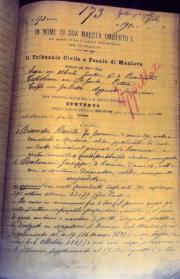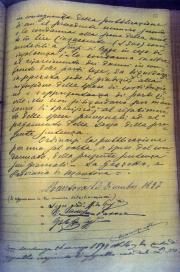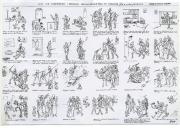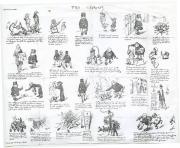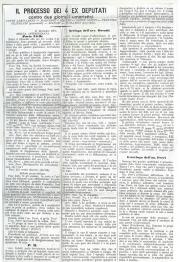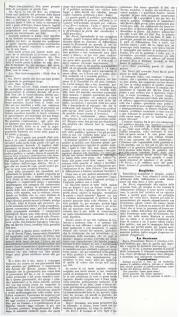In name of His Majesty Umberto I King of Italy
The Civil and Criminal Court of Mantua
Seating the Distinguished Sirs
Lawyer Segre Alberto Foreman of the Jury
Lawyer Castiglioni Guido Lower Court Judge
Lawyer Cappo Gio Battista Bailiff
Has pronounced the following sentence in criminal cause for the petition intent against
BIANCHI DANTE of age 29, born and resident in Mantua, celibate property owner, suddenly works in the newspaper “La Provincia” as a freelance journalist, without being censored.
SCALARINI GIUSEPPE of Rainero, of age 24, born and resident in Mantua, drawer, celibate, uncensored.
Mutually charged of the offences foreseen by the articles 393 first line 395 last justified, 63 and 79 Criminal Code= to have in common (the former being the manager, editor, owner, co-author; the latter being the author and co-author of writings and drawings, publishing and divulgation in Mantua of supplement 19 of the number of Merlin Cocai (March 14th 1897) and a paper dated October 4th-6th 1897 in whose bodies was found:
I) Number, supplement to 19, three sketches; in the first one of which is the image of the complainant Gioppi, working, dressed as a thief, in a room of the bank, where, and on the back of the volumes are the words Lazzaroni, Tanlongo, Guliniello, Monzilli, while on the back of another volume is a question mark, and at the bottom of the page we can read: Gioppi, the great reformer of the Agriculture Bank will be destined to the banking section; in the second one there are the images of the complainant Alberto Capilunghi, Cesare Gioppi, Silvio Arrivabene, Romito Siliprandi in the act of assaulting, dressed as thieves that later escape and at the bottom of the page are the words “the gang assaulting the banks”; in the third sketch the four complainants are illustrated dressed as thieves in the act of surrounding a magistrate, holding weapons, imposing him to pick either a revolver or a coin, and in the bottom of the page are the words: “it will assault the judiciary bench in order to corrupt it”. These sketches, and the four pieces of paperwork are charged as defamatory because they are responsible for complainant acts and highly detrimental decisive facts, delinquent also in a precise reference to notorious delinquent episodes that took place shortly before, regarding people also condemned for decisive property crimes in Italy. The sketches and paperwork charge as defamatory not only the stories taken into consideration, but also the ones made in relation within each other; and part of another sketch with earlier and later paperwork of the same newspaper designed to prepare, help, advise the already evident meaningful decisive defamatory of the sketches and of the words of the supplement.
B) Paper published in October 1897.
Two sketches representing the four complainants, whose decorum and honour is offended with the underlying caption that qualifies them as members of the “Crispi gang”. And this with the reference, as above mentioned, to sketches and previous publications fabricated by Merlin Cocai, and by Bianchi and Scalarini.
As an outcome of the public debate that took place in context with the accused, and their upholders, of all the complainants, the civil part was established on the days 10, 11 and the present 13.
After hearing the accused defences and the civil part that ends saying: “The likes of the Illustrious Court, believing the penal responsibility of the accused, for their ascribed crimes, condemn them to the penalty that its wise judgement will reckon as most appropriate, also condemning them to the restitution of the Civil Part constitution expenses whose liquidation will be followed through according to the Magistrate’s discretion; and finally condemn them to the damage compensation to liquidate in a separate venue.
The publication of the issued sentence on the city newspapers must be ordered. The discussion of the cause was heard; the Public Ministry was heard in its requisitions, as well as the defence lawyers and, once again, the charged, who had the last word.
Done
A weekly periodical under the name “Merlin Cocai”, containing articles and various caricatures, as well as vignettes with subtitles alluding to well known city-personalities, first appeared in Mantua on November 1st 1896, along with the people of the Aldo Mannunzio printing house. Forecasting the future election campaign that had been carried out since that moment, the newspaper went on suggesting as its main purpose the vague defeat of the four ex deputies Silvio Conte Arivabene, Capilupi Marchese Alberto, Lawyer Cersare Gioppi Conte and Dr. Provvido Siliprandi, the last three of which belonging to Crispi’s ministerial majority;
Additional publications from the period of November to last March spreading the most vulgar indecency with generic and outrageous phrases charged and addressed towards Knights, Commanders, bankers and nobles, defining since the first numbers, that is to say N°4 of the instrument gathering, the figure of four ex deputies, continuing in the following (N° 10 & 11) to prelude to swindlers, wrongdoers, more or less crucified thieves or… until N°11, announcing that an eminent person had assured the date of the elections, more importantly with the following N 17 and 19, abandoning each restraint engaging live conflicts towards the above-mentioned deputies, initially depicting them in two sketches in N. 19 respectively representing the four candidates holding their head in the act of presenting themselves to the courteous attention of the Gazzetta di Mantova (The Mantua Gazette) demanding to change clothing, and the other of the room of the monarchic constitutional association in which they are introduced by the Gazette and are now guarded among the relics of the monarchic association, among the mitres, the two-headed eagles and the hats of the carabinieri. On the same date of March 14th a supplement to N. 19 was published with the heading “What the deputies of the Gazette would do if (God free) they were elected” with various sketches representing the four deputies in various attitudes, three of which have been especially noted as incriminated, as will be mentioned later. In the first one, at N. 5 of the first line, Lawyer Cesare Gioppi is represented while writing in a place where there are volumes superscribed to Lazzaroni, Taulongo, Ciminello, Mangilli, Miceli, Nicotera, De Zerbi, Lina, magistrates, parliamentarians and the press above the shelves and on the back of a volume a question mark with a writing below saying “ Gioppi, the great reformer of the Banca Agricola (Agricultural Bank) will be assigned to the banking section. In the second one, marked on N. 11 of the second line the four deputies are represented with something else, dressed as robbers while assaulting a bank, and in the act of running away, with the following caption, existing as cancelled in some models, it will be transparent in others, and totally non-existent in others, and will assault the banks. Finally in the third one, distinguished with N. 12, we observe the bench being attached by four deputies in the same uniform of the act above, in which on one side they are offered a coin, on the other a gun with the following statement = it will attach the bench in order to corrupt it. Other than the previously mentioned, we must also remember the one in which, at N. 3, the four deputies are shown crawling on the ground at the moment of their arrival in Rome as an attitude regarding their visit with Francesco Crispi, with the saying = as soon as they arrive in Rome they will visit Francesco Crispi and supply to be once again enrolled in his mob. Here we notice that it can be read again in some examples, while it doesn’t appear in others. In March’s N. 21, produced only for the hearing, and that is not especially incriminated praising, in this way, these characters appear in the wonderful victories obtained in this Province’s colleges on the candidates of the wrongdoing party, always associated with one another and arrested for belonging to Crispi’s mob, and in vignette N. 2 are the four previously mentioned represented while throwing the population’s sons to the African hyenas, in another vignette they appear reluctant with the social command, where they are immune because they are brothers of the Prefect, from the emblazoned ones that do not know about family morality, to the rich ones that are not affected by taxes, etc…
In N. 25, dated March 26th 1897 the first page announcement to the electors of the city and province continues saying that Sunday morning (the chosen balloting day) the Merlin Cocai would be freely distributed on the side of each section of the colleges of Mantua and Bozzolo, with a ferocious mockery that will keep the gentlemen from voting for Arrivabene and Siliprandi. When the publication of this newspaper came to an end at the beginning of October 1897, the supplement for another weekly periodical called “Sulle rive del Mincio” (On the Shores of the Mincio) appeared, entitled “pro libertate”, that, in figures 1 and 11 recalls other vignettes that represent the same ex deputies incorporated in Crispi’s ex mob, with the legend, the first one “the emblazoned members of Crispi’s mob never were able to digest the bitter taste that their Mantua colleagues had them swallow during the previous elections” and the second: when the electors will no longer think with their head but with what we substituted it with, they will vote for us. This is the conversation that members of Crispi’s mobs, and their representative l’Acanfora have. Bitter due to the repeating of such publications, the four above-mentioned ex-deputies filed a complaint on November 4th 1897 to the distinguished President of this Court against the previously nominated Bianchi Dante, publicist editor of the newspaper “La Provincia di Mantova” and Scalarini Giuseppe, sketch artist, calling them ahead of this Court, with the rite of direct summons to answer together to the crimes they have been charged with, civilly turning themselves in to the complainants and granting the proof of facts to the charged.
In Law
Expecting that, for a court reasoning, the Court should have first of all taken responsibility for two prejudicial actions raised by the defenders of the charged, relatively one to the lack of an express that was requested in the lawsuit from the complainants to proceed through direct summons and the other to the detected omission of the documents in the rite of the charged. Not one or the other exception hold up, as, while the recourse to the President was complied to the prescribed formalities of articles 371 and 371 C.P.P., the Presidential Summoning Decree detected that the rite of direct summoning here mentioned resulted in order that no procedural practice was to be seen in the lawsuit. Furthermore the union of rite documents from the President to the court wrapping wasn’t mandatory, though simply optional, all the more a presence of the rite forms chosen in the unclear case in which the proceedings were taken to the Court’s exposure directly from the injured party, which was not allowed the right or option to re-call such documents of this Court’s records.
In merit
Expecting those that can be judged to admit to making themselves responsible for Merlin Cocai’s incriminated publications, having Bianchi order 1.300 copies of this newspaper among its broadest spread, it so happens that in 100 of these copies the phrase “he will assault the banks” were cancelled using lithographic ink, and due to the lithograph’s new will, opposing his will and the will of his accomplice Scalarini.
Bianchi excludes having in this way any involvement to the courteous attention of the supplement’s publication “Sulle sponde del Mincio” (On Mincio’s banks) on behalf of which Scalarini takes on complete authorship, declaring to the to the hearing that he turned to the Editor of the “Sponde del Mincio ” having to request the Authority of P.S. for the publication of a flying paper, a permission he couldn’t refuse for the fact that the one in question was a regular periodical. Regarding the other paper, that had no date as well, containing drawings that had also been filed complaints for because considered offensive and that he considered a simple campaign manifesto drawn and signed by him, but that had nothing to do with the Merlin Cocai. Expecting that in the double charge exam ascribed to the ones being judged the Court needed to first of all worry about the research of the essentially extreme intentional as much of the libel offence as of the insult offence according to the corresponding Articles 393 and 395 of the Penal Code, considering that for as much as the accused and their defenders claim of having the sole intent to exclude the ex deputies from the elections stigmatizing their political conduct in their brief parliamentary life having belonged to the government by them named Banda Crispina (Crispi’s Mob,) the college could not agree to such a thesis that has been overtly used and justly reprehended by the law and the doctrine. It’s untrue that no matter how legitimate the propriety, the morality and the actions of a citizen that aspires to public offices and especially to legislative power, having the press have the right to clear up the voters on the public life of those that present themselves to their suffrage, it’s also certain that political candidate has the right to have his honour protected by the law and that the electoral period can’t be converted into a field boundless to insults and to the most harmful injustices, also as political intent on the honour and reputation of the opponents. It appeared to someone, adds accordingly the distinguished Pessina, that the period of the electoral conflict was like an exceptional war state in which it was legal, in the norm of the fervent conflict, for the candidates to freely defend with no limits given by penal responsibility, their own lives. We believe that the electoral conflict could be peaceful in ideas and convictions, and should not be a boxing match: “that an eminently free and civil population should not only loathe the material conflict that upsets the sincerity and freedom of the elections but also the violence of the pen that, as a poisonous dagger, snaps at men’s reputations.” The reason of the war state is nothing but a rhetoric fiction, a metaphor that fails in answering the reality of things. The warmth of the electoral dispute can at the most ease the insult’s obtuseness, but not at all excluding nor deserving such a valid observation, as much as wittily raised by the defence, that the lawsuit was determined by a mere resentment due to the defeating of the above mentioned candidates in the last political elections, since even such argument is easily overcome by pondering patiently the effects in tolerating the excesses of the opponents until the end, which means until the closure of the electoral dispute, rebelling only after the publication of the last supplement last October when every episode of the political conflict failed, and after the opponents fully achieved their aim, of which they did not consider themselves satisfied, continuing to tear apart and harass the defeated with the most bitter, pungent and premeditated art of public defamation. The statements left by the accused in N. 27 dated April 1st 1897 saying that they never had the intention of attacking the personal integrity of the complainants when the conflict was already defined along with the second ballot elections the aim of which the judicable had already aimed with an illicit medium also weren’t reliable for the execution of the animus offendendi, because it had been completely reached since they moved on to preannounce, in N. 25 of the repeated periodical, that ferocious publication that was going to keep gentlemen from voting for Arrivabene and Siliprandi, publications that, as appears in N. 26, they aborted for causes that had nothing to do with their will.
Expecting that, by proceeding with the inquiry of the intentional document as for the 12th charge, letter B, also affixed to the load of both of the judicable, the intent to offend and that Scalarini, who other than recognizing without reserve the authorship of the supplement “Pro libertate” to the newspaper “Sulle sponde del Mincio,” admitted to his faults in having a full offensive conscience. Even when he adduced to have maliciously turned to the editor of such periodical, knowing that otherwise the P.S. authority would have stopped the spread of those drawings, his intention to offend is even more obvious, in how he did so at the beginning of last October when every electoral reminiscence disappeared for a noticeably long period of time since that event.
Expecting that, now pausing on the libel offence material, that is on the 2nd extreme official for the existence of such offence concerning the enclosed distribution of a determining fact, the Court did not check the sketches the….. that considered also for themselves considered and in relation with the others found on that paper and to the concomitant writings previous and posthumous to the attribution of a fact that has been concretely carried out, as the constitution of such offence was without a doubt demanded to the jury. What surfaced examining the incriminated sketches and writings that we can observe in N.19’s supplement is that the sketches were preceded by the title “what the Gazzetta deputies would do if they were (God help us) elected” and the writings that below each sketch are affixed to explain and complete the significance of the drawing all bring back to a future and biased event, moreover to the verification of the election of each one of them. Consequently the Court that fights back in the species the above mentioned extreme does not consider this because the attribution to any event or a future, dishonourable, delinquent and conditioned capacity to reveal, during the assignment of an appreciation, even if insulting of professional qualities but never in the attribution of a (non….) fact that is thought to have happened due to his direct and indirect action. Nor, to a different notice they can induce the circumstances that emerged at the public debate and on which most highly rely on the Civil Part, that had the part to understand the incriminated paper produced to the intention that they would be published with the word “newly”, almost if such word tied the past to the future, and could be considered as an indissoluble juridical pretext, since though prescinding from the thought that only three of today’s complainants had formed part of Crispi’s majority in the penultimate legislature, in which Count Arrivabene had decided to remain external yet an always undeniable foundation. Of fact, the circumstance, that the especially incriminated sketches refer not only to works done by members of the above mentioned majority but rather “to what they would have done if they had been elected” and that also those sketches, that did not have a special writing in other types, always form a sole and indissoluble text with a title and headline that includes and takes up all of them.
….thence the libel offence, and necessarily needs to declare the non place to precede in favour of the judicable dependently from such title. Expecting that turning now to a similar inquiry on the subsistence or less of the minor insult offence alternatively and subordinately if in charge of the chargeable, the college observed that the standard of the expressions in such number is to be considered in an isolated manner, assessed in relation to the other non specifically complained expressions, nor recalled in the lawsuit contained in the previously mentioned number as much as in the previous ones made increasingly expressive and eloquent from the meaning of the drawings with which the resemblances of the complainants were traced with the typical bandit uniforms and weapons, apply in a non suspicious way that offence to the honour spread with one of the most powerful advertising means that characterize the murder in which at the last beginning of the paragraph of Article 395 of the Penal Code and untruly assessing the three incriminated sketches put in relation to the announcement anticipated in the previous numbers of the ugly and foul revelations, that represent the four candidates as if belonging to a mob of thieves that are about to attack a bank and/or trying to corrupt the Bench, and most of all the sketch representing lawyer Gioppi, notoriously employed and re-confirmed annually for 15 years as president of the Banca Agricola (Agricultural Bank,) employed, as the following captions point out, in a banking section were volumes concerning people that had been processed and condemned due to well-known banking scandals appear, express according to the Court’s judgement an eminently insulting meaning, that is to say detrimental to wards the complainant’s honourableness. The excuse adduced by the judicable in having understood how to practise a political critique or censorship in occasion of the electoral conflict counts although as demonstrated above, they cross this just insult that had been marked by convenience and respectability owed to the fellow citizens that deserve maximum public consideration and respect.
If not for what we follow the respective responsibility of the judicable was almost how to observe, as if tracking the publication of supplement N. 19 to Merlin Cocai of last March 19th and expanding the lawsuit produced only on November 4th the prescription of the three months in which Article 401 of the Penal Code is unified where the non place had to be declared to proceed towards them to extinct the relating penal action. Expecting that against the generic subsistence resulting exquisitely established and specific to the insult offence for the publication of the supplement “Sulle sponde del Mincio” to the 2nd criminal charge, it was in fact accused how in occasion of the prohibition of a committee for compulsory domicile Scalarini imagined to trace the new fact in a mockery and grotesque representation of the modern complainants, qualifying them as emblazoned members of Crispi’s mob. Now the word “ mob,” so common in everyday language as in law language denotes an aspiration of people that have, as an instinct, criminality against people and proprieties, though the mob qualification that has been attributed to Crispi’s majority to which notoriously, and for a declaration of the complainants themselves, they belonged, doesn’t make up, as previously mentioned, the attribution of a determined fact, but the impolite appreciation of a true fact. Expecting that, for what concerns the objective responsibility of the judicable in such offence, not prone to a prescription, as it occurred at the beginning of last October, Scalarini, whose initials appear at the base of the supplement itself, recognized himself as the only author, while Bianchi denied any participation to the fact itself, like that his negative non contradicted by opposing results justified in his favour the measure of which the Article 393 C.P.P. for how the affinity of types of drawings and the level itself of the writings even in his confrontation with the lawsuit. Expecting that this came due to the effect of the prescription to mark each offence continuation aggravation on even only Scalarini’s behalf. Expecting that in the commensuration of the sentence he needed to keep in due course the intensity of the insults in relation to the personal qualities of the offended and to the lack of any reason or explanation in the composure of the charged having taken care of the time circumstances in which such insult took place, for him the Court sets as a starting point a fine of six-hundred lire, reduced by one-sixth for the judicial mitigating in which Article 59 definitely inflicts such a concretised punishment in which here forth assigned seen for this the Articles 395, 399 in its last part, 401 of the Penal Code; 393, 397, 568, 569, 571 of the Penal Code.
Judges
1st To establish the defendant facts in relation to the publication of the weekly periodical Merlin Cocai the offence of insults in accordance with Article 395, at the last chapter of the Penal Code to yet to libel the terms of Article 393 of the same Code, and consequently not proceeding in the interest of Bianchi Dante and Scalarini Giuseppe for the same facts, being the penal action for prescription effect extinct.
2nd Discharging Bianchi Dante from the ascribed imputation following the publication of the supplement “Pro Libertate” to the periodical “Sulle sponde del Mincio” for not pleading guilty.
3rd Scalarini Giuseppe pleads guilty to the insult crime at terms with Article 395 of the last part of the Penal Code due to his publication second after the previous number and condemns him to the punishment of a five-hundred (500) Lire charge switchable in accordance to the law in case of insolvency; the Court also condemns him to compensate for the damages concerning the injured parts, to be settled in a separate venue, reimbursing the civil representation and constitution expenses that are not paid off for the lack of specifics, to the recoup of the court expenses and the payment of the tax of this sentence. Ordering a once time publication on behalf of the expenses of the sentenced, of this sentence on the newspapers La Gazzetta and Provincia di Mantova.
Mantua, December 13th 1897
Signed Segre – Castiglioni – Caffo
With a sentence on March 26th 1898 N. 14 the Superior Court declines the appeal
On October 26th 1900 Scalarini was granted an amnesty
